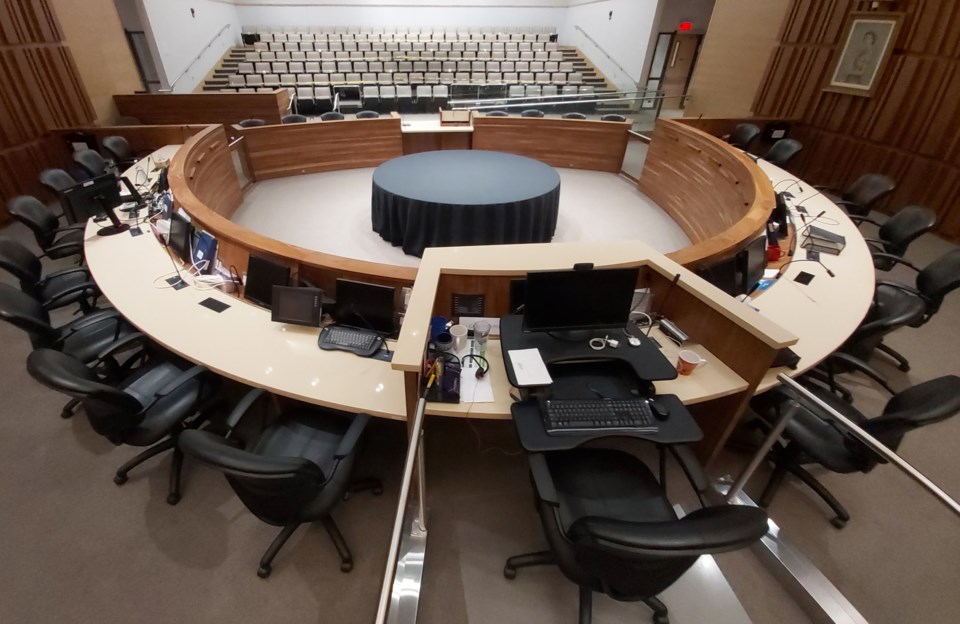It’s August, and unlike last year, there are no city council meetings right now for me to write about.
But this is a city hall column! What am I supposed to do?! (Starts breathing heavily into a paper bag!)
Several minutes later…
Okay, so in lieu of nothing happening in the virtual council chamber right now, let’s talk about some of the stuff that’s already happened there this year.
Reviewing council coverage from the year so far, it occurred to me that I didn’t get a chance to comment about the final vote on the council composition and ward boundary review. I’m still kind of angry at the complete lack of vision demonstrated by council, a group that constantly tries to sell itself as forward-thinking futurists, but in this case they looked 31 years in the past and said, “Nope, that works pretty well.”
It was shocking to watch as members of the current council talked about how two members per ward will create more diversity on council and reduce the possibility of incumbency bias when 11 out of 13 of those people were there last term, and the other two replaced retired members who didn’t run again. But sure, the current system promotes incumbency less compared to one-member wards.
It was also shocking to see the Ward 5 councillors actively endorse a plan that will see them add 10,000 more people to their ward in one quick stroke. Whether the present councillors decide to run or not, everyone running in the new Ward 5 will now have a heck of a lot more ground to cover even while nothing much changes for the people running to represent Ward 6.
In fact, it was shocking to see the areas of the city north of the river essentially give the shaft to the south end, which now struggles for equal representation for another 10 years, an entire decade during which they’ll grow bigger, and faster, than almost every other part of the city combined.
Given that, I was somewhat amused by the people living downtown and in the Ward complaining on social media that they’re no longer in Ward 1. They do know that the wards are not numbered according to some unknown determinate factors of quality, right?
The jig was up when Ward 6 councillor Mark MacKinnon proposed an amendment to approve the eight-ward map with two-part-time councillors from each ward. After all, if more councillors equals more and better democracy, then this amendment would be a further step in the right direction…
Council almost unanimously disagreed. It’s almost like they were invested in the status quo.
I don’t know if a public process would have changed that. When you go to the public on matters like government reform, they will more or less endorse the way things are because that’s the way they’re used to doing things. That’s why referendums on electoral reform always fail.
What I do know is that a council that so often says it favours expertise took a consultants report we paid for, written by people who review municipal ward boundaries for a living, and tossed in the trash. Thanks, but no thanks. In return, we got a new six-ward map that just basically moved a couple of lines; Ward 4 now ends at the Hanlon instead of one street over on Silvercreek.
We probably could have done that in house on the cheap.
But that’s been a theme of this term of council, the friction between the politics and the policy.
Take the debate over the Cultural Heritage Action Plan, which was already controversial before it came to council due to tension between staff and Heritage Guelph about its direction. Much of that was around the question of the proposed Ward West Heritage district because it’s still hard to articulate why staff thought that was the priority over Catholic Hill, or the Ontario Reformatory lands.
That much was at least resolved in June when council decided to prioritize the Reformatory lands over Ward West, but the issue goes beyond heritage. One of the reasons I wasn’t able to write about the council composition decision until now is because that was the same week a motion to look at more voting options for people with disabilities was coming to council and I wanted to lend it some support.
But that’s another great example of these fissures between staff, council, and the local expertise on advisory committees; the Accessibility Committee said mail-in wasn’t good enough, they gave staff a reasonable suggestion, and the full recommendation comes to council with no additional options to the mail-in ballot.
Is it any wonder that it looks like the city is having trouble attracting people to serve on advisory boards and committees, like the recently extended deadline for, of all things, the Council Remuneration and Support Advisory Committee?
Perhaps we should all spend our summer vacation thinking about the way things are and consider that they haven’t been working the way they should for a while. We may be unwilling to change council, but there should still be some room for improvement.
